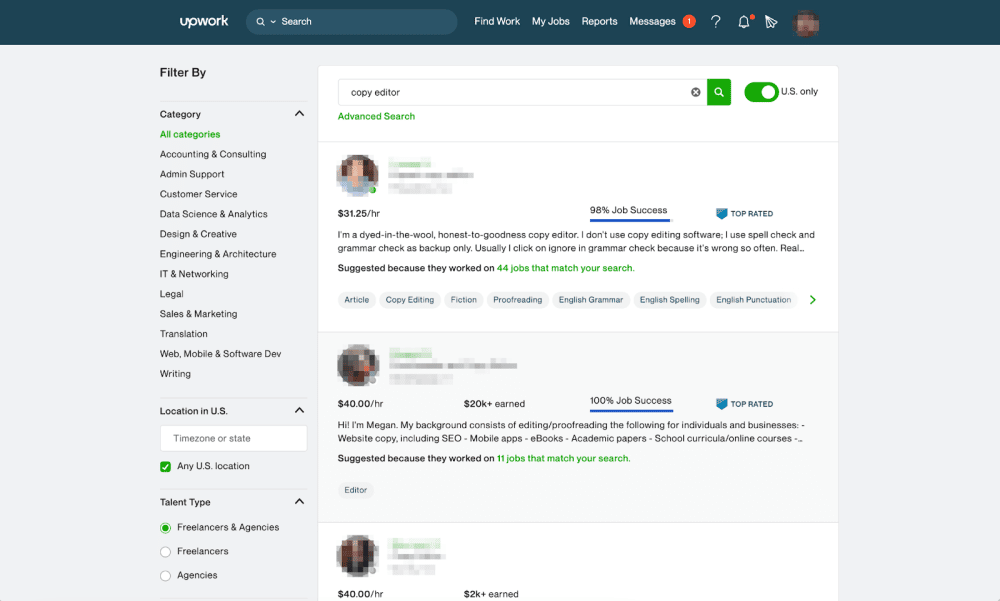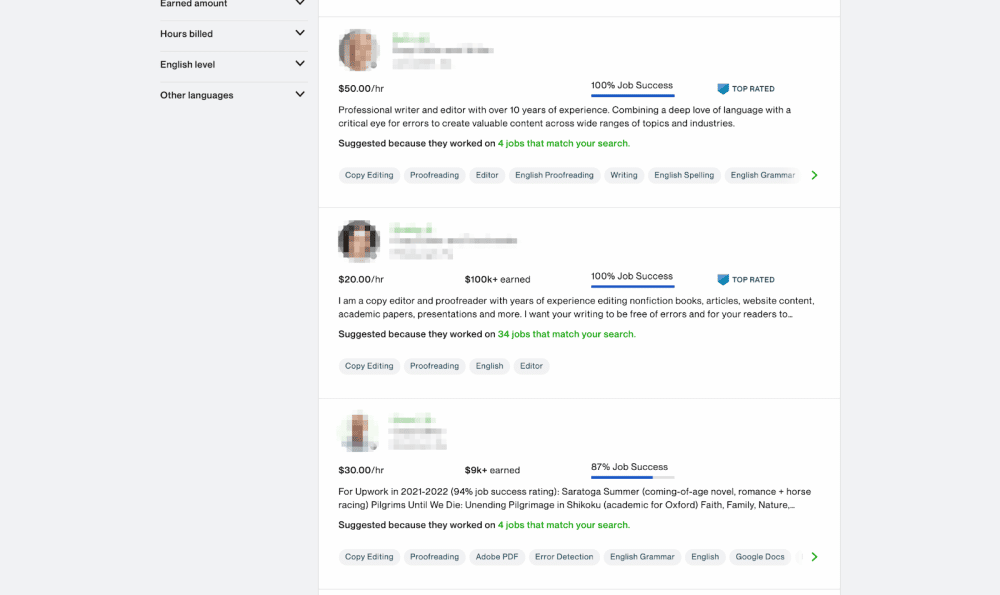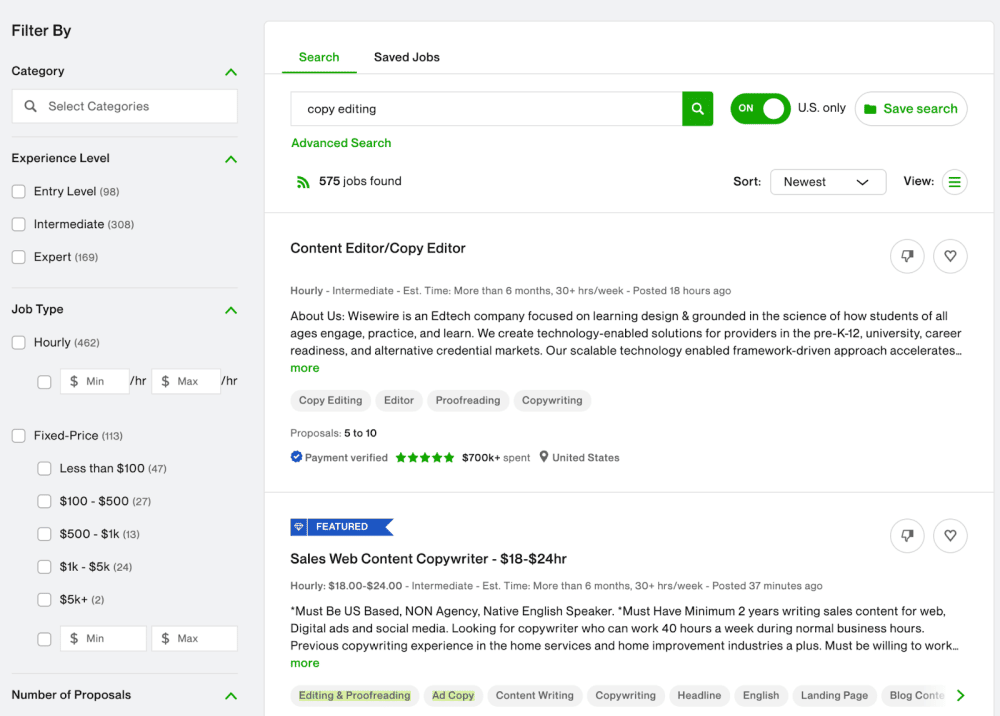
How to Get Work as a Freelance Copy Editor

Freelancing is an enticing career path that’s gaining popularity because you can be your own boss, set your schedule, and choose your clients.
This makes it particularly copy editors.
But how can I get work as a freelance copy editor?
Well, it involves gathering your credentials, signing up for job boards, and actively reaching out to potential clients.
This guide will walk you through each step on how to get copy editing work.
Learn how to start a freelance business in your field:
Freelance Mechanic | Freelance Electrician | Freelance Engineer | Freelance Accountant | Freelance Barber | Freelance Hair Stylist | Freelance Software Developer | Freelance Content Strategist | Freelance Physical Therapist | Freelance Bartender | Freelance Chef | Freelance Medical Assistant | Freelance CycleBar Instructor | Freelance CrossFit Coach | Freelance Content Writer | Freelance Piano Tutor | Freelance Waxing | Freelance Audio Editor | Freelance Data Analyst | Freelance Photographer | Freelance Tutor | Freelance Videographer | Freelance Welder | Freelance Teacher | Freelance Video Editor | Freelance Real Estate Agent | Freelance UX Designer | Freelance Administrative Assistant | Freelance Social Media Manager | Freelance Carpenter | Freelance DJ | Freelance Illustrator | Freelance Copywriter | Freelance Personal Trainer | Freelance Grant Writer
1. Become a Hireable Candidate
Since there is fierce competition among freelance copy editors, you have to make yourself stand out.
You’ll need to showcase your qualifications, skills, and previous work to distinguish yourself from your competitors.
Let’s discuss how you can become a hireable candidate.
Gather Your Credentials
Do you have a bachelor’s degree in journalism or English?
Were you a full-time copywriter, content writer, or content editor for a company before setting out on your own?
If so, it’s time to gather all the materials that showcase your value to potential clients.
Create a list of your schooling, training, and experience. Doing so will prove that you’re an ideal candidate for any role.
Write an Incredible Cover Letter and Resume
Once you gather your credentials, you can draft and finalize your cover letter and resume.
Cover Letter
A cover letter is a one-page document that explains why you’re the perfect candidate for the job.
You may need to modify your cover letter for different clients, but the core should remain the same.
In addition, the cover letter should explain how your previous experience and expertise can help the potential client.
You should also discuss how many years of experience you have in proofreading, editing, and formatting. The goal of a cover letter is to showcase your command of the English language and explain why the client should hire you.
Resume
Next, you should create a resume that summarizes your qualifications, credentials, and editing skills.
If you have certifications for the AMA style, AP style, or Chicago Manual of Style, make sure to list them on your resume.
Creating a polished cover letter and resume showcases professionalism and competence.
Some clients require a resume (some just want work samples), so it’s crucial to have one ready if they ask for one.
Get Professional Headshot Photographs
The last step toward becoming a hireable candidate is to get professional headshots. Since freelance platforms like Upwork allow you to upload a profile image, it’s essential to have a good picture.
If possible, skip the selfie and book an appointment with a real photography studio. You’d be surprised by the impact of a well-composed headshot.
Your photographer may take pictures of you in multiple poses with different facial expressions. Use a photo where you’re smiling warmly to let your potential clients know that you’re friendly and eager to work with them.
2. Set a Competitive Rate
When you apply for jobs, the client will ask you how much you charge. It’s essential to have a fair but competitive rate ready when they ask.
Decide How Much You Want to Be Paid
Your rate should reflect the amount of copy editing experience you have. Professional copy editors can charge much more than beginners.
If you have worked as a freelance copy editor before, you may have a rate already. If you’re unsure what to charge, you’ll need to do some research.
Here’s how to learn what other editors charge:
- Go to Upwork.com and type “copy editor” into the search bar.

- Click the magnifying glass to the left of the search bar, and click Talent: Find freelancers and agencies. It will return a list of all the contractors offering copy editing services on Upwork.

- Scan through a few profiles and find individuals with similar qualifications and experience as you. Base your rate on their rates.

Upwork and other freelance platforms ask you to charge an hourly rate by default. If you or your client would prefer a per-word contract, you can arrange that in negotiations.
How Much Do Freelance Copy Editors Usually Charge?
According to ZipRecruiter, the average freelance copy editor salary is $52,748 per year, and the average hourly rate is $25 per hour.
However, some freelance editors charge upwards of $100 per hour.
Here are some factors impacting an editor’s rate:
- Experience
- Project type
- Specialized skills
Let’s discuss each of these factors.
Experience
Experience and salary increase together in most industries.
Copy editors with decades of experience can charge a higher rate for their expertise. New editors with less experience and smaller portfolios charge less.
Project Type
According to the Editorial Freelancers Association (EFA), copy editor rates vary based on the type of editing project.
Here’s how the EFA breaks down editor salaries by job type:
- Fiction: $36-$40 per hour or $.02-$.029 per word
- Nonfiction: $41-$45 per hour or $.03-$.039 per word
- Business/sales: $46-$50 per hour or $.04-$.049 per word
- Medical/STEM: $46-$50 per hour or $.04-$.049 per word
Specialized Skills
Niche skills create demand. You can attract higher-paying clients by providing services not offered by your competitors.
For example, SEO skills are highly valued in the content marketing industry. If you can line-edit and optimize content for search engines, you’ll be justified in increasing your rate.
Fact-checking, citation-writing, and developmental editing are other skills that can help you boost your salary.
Related: How to Answer the Question “How Much Do You Charge?”
3. Join the Freelancing Platform Upwork
While many websites offer freelance copy editor work, Upwork is the easiest to use and has the widest range of clients. It’s one of the most popular websites for finding freelance work for any type of job.
Hopefully, you’ve already signed up for Upwork to research editor rates, as we discussed in section two.
If not, here’s how to create your account and get your first gig.
Join the Platform
Head over to Upwork.com and click the “Sign Up” button on the upper right-hand side of your screen.
You’ll be asked to enter key information, including your email address and password.
Next, Upwork will ask you to describe what type of jobs you’re searching for. Select “copy editing” and other related jobs like “proofreading,” “copywriting,” and “editing.”
Create a Profile
Your profile bio should outline your skill set and explain what makes you the best copy editor. Use your cover letter as inspiration for your profile bio.
You should also add your certifications, employment history, and other relevant experience.
Adding as much information as you can to your Upwork profile increases your chance of getting hired.
As a new Upwork profile, you won’t have any reviews or Upwork job history, so it’s crucial to give potential clients a comprehensive overview of your experience and skill set as a copy editor.
Browse for Relevant Jobs
Once you finish updating your Upwork profile, you can begin browsing for jobs.
Here’s how to find jobs on Upwork:
- Type “copy editing” in the search bar. A list of relevant jobs will appear. These jobs are posted by various Upwork clients looking for freelancers to help them.

- Browse through the listings, read the job descriptions, and open new tabs with all the jobs that are relevant to your skillset.
Keep in mind that some employers are hesitant to hire new Upwork accounts, so plan to apply to a lot of jobs, as it will increase your chances of getting an interview.
Apply to Jobs
After narrowing down your list of potential jobs, you can begin applying to them.
The application will ask for your proposed rate (you can change it based on the job). It will also ask for a cover letter and resume.
Enter the required information and upload your resume. Be sure to modify your cover letters based on the gig.
For example, if you’re applying for a medical copy editor job, you focus your cover letter around your experience writing or editing healthcare-related content.
Relevancy is highly important because it shows the client you are capable of meeting their specific needs.
Learn How Upwork Handles Payments
Upwork takes a percentage of your earnings in exchange for helping you find work.
The fee depends on your lifetime earnings with each client.
Here’s a breakdown:
- $0-$500 in earnings: Upwork takes 20%
- $500.01-$10,000: Upwork takes 10%
- $10,000.01 or more: Upwork takes 5%
As you earn more with a client, your service fee gets lower.
For this reason, it’s best to work with long-term clients. You’ll face fewer service charges if you make $20,000 from one client than $20,000 from multiple clients.
Once you start earning money from Upwork clients, there are several ways to receive your payout:
- Direct to U.S. Bank (ACH): Free
- Direct to Local Bank (Outside the U.S.): $0.99 per transfer
- U.S. Dollar Wire Transfer: $30 per transfer
- Instant Pay (for U.S. Freelancers): $2 per transfer
You can also receive your money through PayPal, Payoneer (outside the U.S.), and M-Pesa (Kenya only).
3. Browse Other Job Boards
You can only apply to a certain number of Upwork jobs based on the number of “Available Connects” you have.
When you run out of credits, you’ll need to purchase more to apply for more jobs.
You can look for jobs on other job boards when this occurs.
Here is a list of job boards:
Indeed
Indeed.com was founded in 2004 and has been a reputable name in the freelance space for nearly two decades. This website aggregates job postings from thousands of different websites.
You can set job alerts to send you an email when relevant jobs are posted.
ZipRecruiter
ZipRecruiter.com is an excellent website for finding full-time freelance copy editing jobs. Working full-time for a client eliminates the need to find and manage multiple clients.
ProBlogger
ProBlogger.com is a job board exclusively for content writing and editing jobs. You’re likely to find dozens of jobs that interest you here.
SimplyHired
SimplyHired.com is an employment website launched in 2003. Similar to Indeed, SimplyHired aggregates job listings from thousands of different job boards and websites.
FlexJobs
FlexJobs.com lists remote, part-time, freelance, and flexible jobs. All kinds of companies advertise their openings here, from small startups to large enterprises.
5. Learn How to Network

Networking can lead to even more opportunities.
So, you should introduce yourself to people and let them know that you’re a professional copy editor.
They may not need your services today, but they may call you back if they’re ever looking for line edits or proofreading.
Here are a few ways to network:
Email Blasts
If you’re struggling to find clients on Upwork and other job platforms, you can send cold emails to potential clients.
This technique works best if you identify your target audience and jot down a list of relevant companies based on your expertise.
For example, if you specialize in editing business writing, reach out to some business blogs. Find the email address of a relevant contact, and send a message explaining that you’re a freelance copy editor that can improve the writing on the blog’s website.
Cold Calling
You can also try cold calling your list of potential clients. Explain to the client how you found their website, what you are offering, and how you can improve their publication.
Of course, you may have more luck applying through job boards since potential clients are guaranteed to have open positions.
In-Person Networking
Just because you work on your computer doesn’t mean that’s where you have to network. In-person networking events are a great opportunity to meet business owners who might need your services.
Check out your local Chamber of Commerce’s website and learn about the events they have going on. Swing by a meetup with business cards, and be prepared to talk about what you do for your clients.
Even if the people you meet don’t need your services, they may know someone who does!
Learn More With the 10 Small Business Essentials Every Freelancer Needs
Conclusion
We hope this guide has helped you on your journey to becoming a prosperous freelance copy editor.
Finding freelance work requires a bit of effort on your end to begin. However, once you start finding clients and getting paid, you will become more and more hireable.
Also, as you begin your freelance career, it’s important to remember that you’ll need insurance. Selfgood offers supplemental health insurance to help independent contractors like you stay healthy and productive.
Sign up for Selfgood today!
Subscribe To SelfGood
Get up to date perks and Gigworker news. Easy. Simply. SelfGood. Subscribe.





